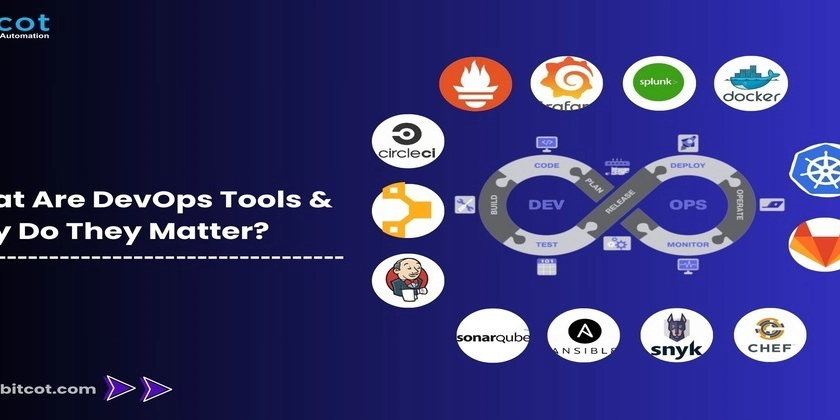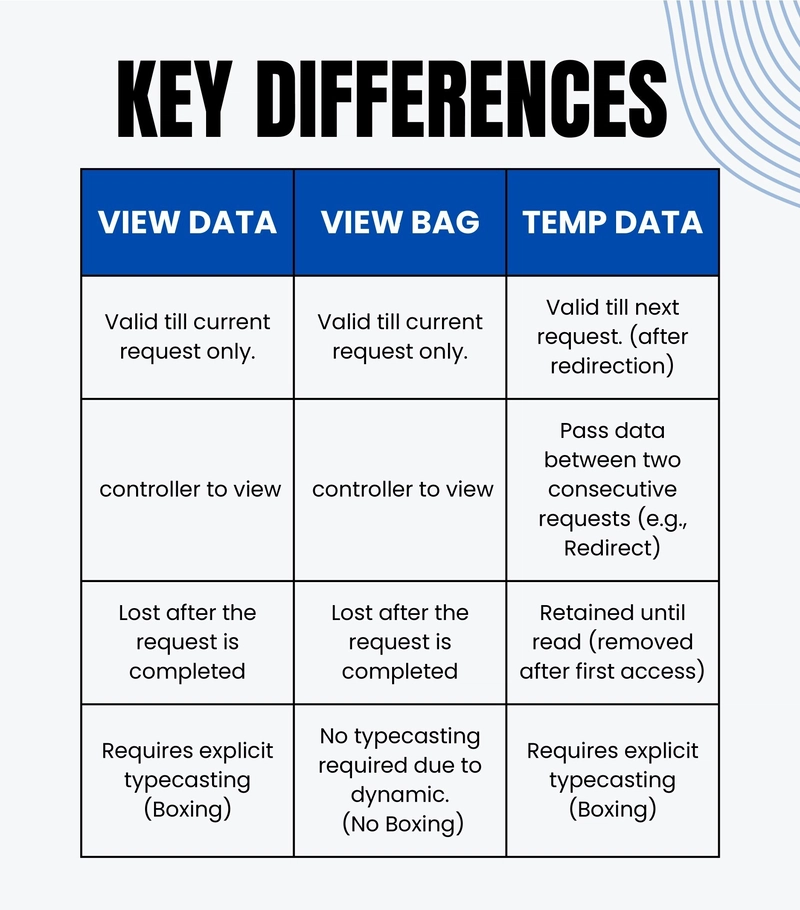What Are DevOps Tools & Why Do They Matter?
Technology is evolving rapidly, and businesses need to keep up. Software development used to be a long, complicated process, but today, DevOps tools help teams work faster and more efficiently. These tools automate tasks, improve collaboration, and ensure that software is delivered without delays or errors. But what exactly are DevOps tools, and why are they so important? Let’s break it down in simple terms. What Are DevOps Tools? DevOps tools are software applications that help developers and IT teams manage the entire software development lifecycle. These tools support: -Automation – Reducing manual tasks to speed up development -Collaboration –Helping teams work together efficiently -Monitoring & Security –Ensuring stability and security throughout the process By integrating development (Dev) and operations (Ops), DevOps tools allow companies to deliver software updates quickly and reliably. Why Do DevOps Tools Matter? 1. Faster Software Development Before DevOps, developers wrote code, and then IT teams manually deployed it. This caused delays. DevOps tools automate these steps, reducing deployment time from weeks to just hours. 2. Fewer Errors & Bugs With continuous integration (CI) tools, developers can test code changes in real time. This means fewer bugs and better software quality. 3. Better Collaboration Between Teams DevOps breaks down barriers between developers, testers, and IT operations. Everyone works together on a single, streamlined process, making communication easier. 4. Improved Security & Compliance Many DevOps tools include security checks, ensuring that vulnerabilities are caught early. This protects businesses from data breaches and cyber threats. 5. Cost Savings & Efficiency By automating processes and reducing downtime, companies save money on development and maintenance costs. Popular Types of DevOps Tools Now that we know why DevOps tools are important, let’s explore some common types: 1. Continuous Integration & Continuous Deployment (CI/CD) Tools These tools help developers test and deploy code automatically, ensuring updates are released smoothly. Examples: Jenkins, GitLab CI/CD, CircleCI 2. Configuration Management Tools These tools help manage infrastructure, reducing human error in server configurations. Examples: Ansible, Puppet, Chef 3. Monitoring & Logging Tools Monitoring tools track system performance, helping teams identify and fix issues before they become critical. Examples: Prometheus, Grafana, Splunk 4. Containerization & Orchestration Tools Containers package applications and their dependencies, making them portable across different environments. Examples: Docker, Kubernetes 5. Security & Compliance Tools Security tools integrate into the DevOps pipeline, identifying risks early in development. Examples: SonarQube, Snyk How to Choose the Right DevOps Tools? With so many tools available, how do you choose the right one? Here are some key factors to consider: Company Size & Needs- Small startups may need simpler tools, while large enterprises require advanced automation. Integration Capabilities- The tool should work smoothly with your existing software. Ease of Use- Complicated tools can slow down progress rather than speed it up. Security Features- Look for tools that provide built-in security measures. Cost & Licensing- Open-source tools are cost-effective, but some paid tools offer better support. The Future of DevOps Tools As technology advances, AI and automation will play a bigger role in DevOps. Predictive analytics, machine learning, and self-healing systems will make development even more efficient. Companies that embrace DevOps will stay ahead of the competition, delivering high-quality software faster than ever. Conclusion DevOps tools have transformed the way software is developed and delivered. They help businesses automate tasks, reduce errors, improve security, and speed up deployment. Whether you’re a startup or a large company, choosing the right DevOps tools can save time and money while ensuring high-quality software. If you haven’t started using DevOps tools yet, now is the time. The faster and more efficient your development process, the more successful your business will be. FAQs 1. What is the main goal of DevOps tools? DevOps tools aim to automate and streamline software development, ensuring faster deployment, fewer errors, and better collaboration. 2. Are DevOps tools only for large companies? No. Startups, mid-sized businesses, and enterprises can all benefit from DevOps tools. The key is choosing the right tools for your needs. 3. What is the difference between DevOps and traditional IT operations? Traditional IT operations separate development and deployment, leading to delays. DevOps integrates both, making software deliv

Technology is evolving rapidly, and businesses need to keep up. Software development used to be a long, complicated process, but today, DevOps tools help teams work faster and more efficiently. These tools automate tasks, improve collaboration, and ensure that software is delivered without delays or errors.
But what exactly are DevOps tools, and why are they so important? Let’s break it down in simple terms.
What Are DevOps Tools?
DevOps tools are software applications that help developers and IT teams manage the entire software development lifecycle. These tools support:
-Automation – Reducing manual tasks to speed up development
-Collaboration –Helping teams work together efficiently
-Monitoring & Security –Ensuring stability and security throughout the process
By integrating development (Dev) and operations (Ops), DevOps tools allow companies to deliver software updates quickly and reliably.
Why Do DevOps Tools Matter?
1. Faster Software Development
Before DevOps, developers wrote code, and then IT teams manually deployed it. This caused delays. DevOps tools automate these steps, reducing deployment time from weeks to just hours.
2. Fewer Errors & Bugs
With continuous integration (CI) tools, developers can test code changes in real time. This means fewer bugs and better software quality.
3. Better Collaboration Between Teams
DevOps breaks down barriers between developers, testers, and IT operations. Everyone works together on a single, streamlined process, making communication easier.
4. Improved Security & Compliance
Many DevOps tools include security checks, ensuring that vulnerabilities are caught early. This protects businesses from data breaches and cyber threats.
5. Cost Savings & Efficiency
By automating processes and reducing downtime, companies save money on development and maintenance costs.
Popular Types of DevOps Tools
Now that we know why DevOps tools are important, let’s explore some common types:
1. Continuous Integration & Continuous Deployment (CI/CD) Tools
These tools help developers test and deploy code automatically, ensuring updates are released smoothly.
- Examples: Jenkins, GitLab CI/CD, CircleCI
2. Configuration Management Tools
These tools help manage infrastructure, reducing human error in server configurations.
- Examples: Ansible, Puppet, Chef
3. Monitoring & Logging Tools
Monitoring tools track system performance, helping teams identify and fix issues before they become critical.
- Examples: Prometheus, Grafana, Splunk
4. Containerization & Orchestration Tools
Containers package applications and their dependencies, making them portable across different environments.
- Examples: Docker, Kubernetes
5. Security & Compliance Tools
Security tools integrate into the DevOps pipeline, identifying risks early in development.
- Examples: SonarQube, Snyk
How to Choose the Right DevOps Tools?
With so many tools available, how do you choose the right one? Here are some key factors to consider:
Company Size & Needs- Small startups may need simpler tools, while large enterprises require advanced automation.
Integration Capabilities- The tool should work smoothly with your existing software.
Ease of Use- Complicated tools can slow down progress rather than speed it up.
Security Features- Look for tools that provide built-in security measures.
Cost & Licensing- Open-source tools are cost-effective, but some paid tools offer better support.
The Future of DevOps Tools
As technology advances, AI and automation will play a bigger role in DevOps. Predictive analytics, machine learning, and self-healing systems will make development even more efficient. Companies that embrace DevOps will stay ahead of the competition, delivering high-quality software faster than ever.
Conclusion
DevOps tools have transformed the way software is developed and delivered. They help businesses automate tasks, reduce errors, improve security, and speed up deployment. Whether you’re a startup or a large company, choosing the right DevOps tools can save time and money while ensuring high-quality software.
If you haven’t started using DevOps tools yet, now is the time. The faster and more efficient your development process, the more successful your business will be.
FAQs
1. What is the main goal of DevOps tools?
DevOps tools aim to automate and streamline software development, ensuring faster deployment, fewer errors, and better collaboration.
2. Are DevOps tools only for large companies?
No. Startups, mid-sized businesses, and enterprises can all benefit from DevOps tools. The key is choosing the right tools for your needs.
3. What is the difference between DevOps and traditional IT operations?
Traditional IT operations separate development and deployment, leading to delays. DevOps integrates both, making software delivery faster and more efficient.
4. Are DevOps tools difficult to learn?
Some tools have a learning curve, but many offer user-friendly interfaces and documentation to help teams get started.
5. Can DevOps tools improve security?
Yes. Many DevOps tools include built-in security features to detect vulnerabilities early in the development process.









































































































































































![[The AI Show Episode 142]: ChatGPT’s New Image Generator, Studio Ghibli Craze and Backlash, Gemini 2.5, OpenAI Academy, 4o Updates, Vibe Marketing & xAI Acquires X](https://www.marketingaiinstitute.com/hubfs/ep%20142%20cover.png)


























































































































![[FREE EBOOKS] The Kubernetes Bible, The Ultimate Linux Shell Scripting Guide & Four More Best Selling Titles](https://www.javacodegeeks.com/wp-content/uploads/2012/12/jcg-logo.jpg)



![From drop-out to software architect with Jason Lengstorf [Podcast #167]](https://cdn.hashnode.com/res/hashnode/image/upload/v1743796461357/f3d19cd7-e6f5-4d7c-8bfc-eb974bc8da68.png?#)







































































































.png?#)




.jpg?#)




















 (1).webp?#)











_Christophe_Coat_Alamy.jpg?#)








































































































![Rapidus in Talks With Apple as It Accelerates Toward 2nm Chip Production [Report]](https://www.iclarified.com/images/news/96937/96937/96937-640.jpg)








































































































































